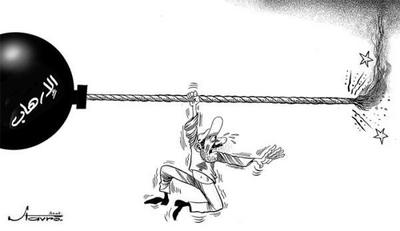Two Caricatures, Lebanon, and a Passage of Rambles
This first caricature is by Armand Homsi (From An-Nahar).
"She is waiting for the Mehlis report"
This is by Stavro (from Al-Balad).

"Terror"
Together, they make quite an interesting summary of Lebanon today. Stagnant. Impotent. Waiting. A recent comment said that Lebanon is "Waiting for Godot", and, especially with the recent reports that Mehlis hasn't gathered hard-core evidence, I cynically believe that. The UN has turned down the concept of an international court for the results of the investigation, but have said that they will support a domestic trial in the same way they did for Sierra Leone and Cambodia. This means that the bigger players will not get incriminated. So why don't we move on. Will the Mehlis Report quench our desire for the Truth, which in itself is a misnomer for our deeply trenched desire for fundamental change? If the higher circles of Syria do get directly incriminated, will that change Lebanon's course? Maybe. The report will be released soon, and we will find out. There will be other effects that are related to the report as well. However, there are several things that could happen NOW, and that are independent of the report. The government has to stop focusing on Lahoud (as long as he doesn't get incriminated). If government sessions are going to be obsessed with his role in the government for the remainder of his term, then God help Lebanon. The political leaders have to stop dealing with abstract concepts. At this moment, I couldn't care less about the role of religion, arabism, socialism, rightism, zionism, and all the other barrage of largely meaningless words with regards to the state of Lebanon. I care about what the government is going to do NOW. Seniora took an interesting path when privatization was mentioned, but instead of the pro and anti privatization parties have a serious discussion, insults were traded. I can't but help compare to the state of things in America. Here, people complain about education, health, social security, cost of housing, subsidies, etc. They discuss things that directly affect their lives, and their leaders follow suit. We still live in the dreams of grandiosity. There needs to be more transparency. Models of accountability need to be developped. Political audits need to be performed. Let the Lebanese democracy (or what is left of it) function as a democracy - rule of the majority. True, this shouldn't be at the expense of the minority, but we have taken it to the extreme and try to please (appease) everyone. Hezbollah should stop complaining about the FBI, but those who say that this American intervention is neutral also shouldn't look at things so lightly. It has been mentioned that it is better to have America involvement than Iranian involvement, and that might just be an aspect of real-politik, but we have to learn how to control the levels of involvement. The Internal-External dialectics, that have controlled the dynamics of this country for over a 100 years, have to be studied and understood, and not to be simplified. With every civil strife there exists the "point of no return into civil war", and after all of our past experiences, we have not attempted to redress the internal imbalances, nor attempted to morph our society into a more functional form of pluralism and co-existence. We need an official form of national reconciliation. Not the political game that was played the past several months. Other societies have developped a collective need to remember their past as a precondition for facing the future, yet we are willing not to speak of it. For reconciliation to be taken seriously, the efforts have to be deeprooted, requiring a serious look at the very core of social relations, and not simply to concentrate on the period of most recent conflict. But this isn't only the job of politicians. It is a social endeavour. In one community in Guatemala (which had its own civil war), the villagers were aided in creating a play that enacted (to some point) the violences that had occured, and also recited sections of the constitution that were trampled during their strife. They had moved on, and are waiting for the country, and the international community to do their part. We still need to do our part. It is dangerous to just let the war slip us by, because memory has a collective dimension and provides its own dynamic. Although this is long term, it has to start soon. We need social reforms in order to try to attempt to provide the nation with the basic necessities of life. Some are so quick to bring in the American model, yet don't apply America's own legend: Life, Liberty, and the Pursuit of Happiness. Reforms need a census, and it is time to ignore the self-inflicted political sensitivities. We need a circle of intellectuals and thinkers who are willing to discuss with people that do not share their view. We need much more, but for now, we should not keep waiting for the truth before doing something.
Comment: Here is an interesting discussion on the importance of the Mehlis Report, and the possible effects it might have in Lebanon.


0 Comments:
Post a Comment
<< Home